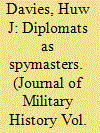| Srl | Item |
| 1 |
ID:
116768


|
|
|
|
|
| Publication |
2012.
|
| Summary/Abstract |
During the Peninsular War, General Lord Wellington orchestrated and utilised one of the most sophisticated intelligence collection apparatuses of the nineteenth century. Not only was the intelligence collected by his own personnel made available to him, but so too was that collected by a group of civilian agents recruited and controlled by the British diplomats in Portugal and Spain, Charles Stuart and Henry Wellesley. This article analyses the organisation and evolution of these intelligence networks during the critical years of the Peninsular War. It then explains the impact of this intelligence on Wellington's military planning, specifically focusing on the opening campaigns of 1812. It then locates the historical importance of the intelligence networks developed in the Iberian Peninsula, by comparing them with later examples during the Crimean War (1853-56), and preceding the outbreak of the First World War (1914-18)
|
|
|
|
|
|
|
|
|
|
|
|
|
|
|
|
| 2 |
ID:
097875


|
|
|
|
|
| Publication |
2010.
|
| Summary/Abstract |
Wellington's first independent command has been seen as a short, but intense, 'baptism of fire' in which the young Lieutenant-Colonel Arthur Wellesley commanded a small force against the insurgent, or 'freebooter', Dhoondiah Vagh. New evidence presented here, however, demonstrates that the three-month military campaign was preceded by several months of political negotiation and intelligence gathering designed to isolate Dhoondiah and starve him of sanctuary, support and sustenance. As a result, the campaign was much more complex than previously thought, and demonstrates important lessons about British imperial expansion in the region at the beginning of the nineteenth century, on the nature of British authority in India, and on the opening stages of the military career of the future Duke of Wellington.
|
|
|
|
|
|
|
|
|
|
|
|
|
|
|
|